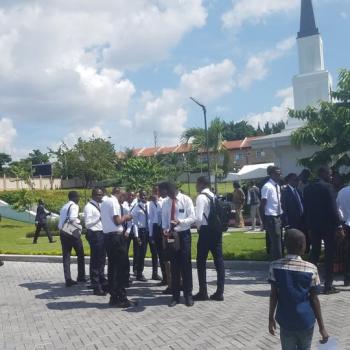 Yes, it is foolish to rush in yet again after the reception my initial blog post received. Nonetheless, here I go.
Yes, it is foolish to rush in yet again after the reception my initial blog post received. Nonetheless, here I go.
Let me first address the two main talking points which have been repeated by many supporters of “Ordain Women.” First, the gathering on October 5th, followed by a press conference, is not a protest. In fact, said H. Beal, “This is not a protest. Anyone who characterizes it as such is seeking to dismiss or malign us.” In two sentences, she has assumed motivation and made accusation. Of course, people looking for descriptors of the event have been having a hard time using any other word. For example, Ninevah Dinah of Fox 13 said:
Some women members of the Church of Jesus Christ of Latter-day Saints are demanding change.
First they pushed to wear pants to church on Sunday, and now a group of Mormon feminists plan to protest during General Conference in October. They want the church to let them attend the priesthood session; they’re also pushing to be part of the priesthood.
Until OW comes up with another word that sounds better than a euphemism, “protest” will continue to be used. If it looks like a duck and quacks like a duck, you’d better call it a winged waddler before someone suggests it’s a duck.
The second talking point is the huge difference between the access the Genesis Group presidency had to Mormon apostles, who could effect change, and the lack of access that women today face.
Let’s remember a few things about Genesis first: 1) The initial approach by Gene Orr was not answered. Darius Gray, known as a loyal Mormon and a KSL reporter, made the second and successful approach. 2) There was no set agenda. The three black men, each of whom was very different from the others, went in with a problem–the loss of their children to church activity–and a desire to discuss the issue. DISCUSS THE ISSUE. That was it. Eventually, Gene Orr did ask for the priesthood, but Ruffin, the one who repeatedly said, “Don’t rock the boat,” was simply concerned about his sons. The open-ended agenda and the concise statement of the problem got President Joseph Fielding Smith’s attention. The meetings began.
Now, contrast that with the list of OW desires which April (from Exponent II) supplied. There are twenty-two items.
When I get a paper from a student which has a firecracker thesis–meaning it blasts everywhere–I return it with a challenge to focus on one or two objectives.
I thought Laura Candland Asplund had some good observations and I loved that she refrained from hyperbole. She, too, noticed the difference between 1971 and now:
I immediately thought that if women requested such a meeting, it would most likely not be granted, and would most likely be met with chastisement and condemnation rather than true listening. Maybe I am ignorantly and unfairly making this assumption. My years of attempts at dialogue in my own congregation, beginning with my tenure as Laurel president when I was a teen, and then finally simply deciding to keep my thoughts silent and private in order to not be punished or hurt, make me think otherwise. I don’t love the idea of protest at church, but I believe that it may be the only way for Mormon women to be heard.
(Sorry for the use of the word “protest,” but no alternative has yet been offered.)
It’s a valid point. Feminists are up against years of tradition and accepted role models which might look like they came straight out of June Cleaver’s kitchen. Yet, I see great hope for the upcoming generation, and even for us older folks. I see a group of young feminists being organized at BYU with one of my favorite former students at the helm. I even had a chat in the temple this morning with a bride’s mother, who has hopes for her daughter’s beyond-marriage future. I mentioned that my married daughter is pursuing her Master’s degree. The bride’s mother said that her daughter is planning on doing the same. I saw strong women all around me.
Laura closes her note with these words: “Sadly, I know of no evidence that things have changed since ’79. Somebody please tell me I’m wrong.”
I’m happy to say that there is evidence, Laura, that we are making wonderful progress. Hence, you could be wrong. You are too young to remember the temple film I saw in 1979, but it was changed markedly several years later, linking the woman more closely to God than the previous one had. The new film is better yet. Might there be a change in wording soon? Oh, yes. Very possible. I have learned that nothing is impossible with the Lord. And obviously, #17 on the long list was at least partially fulfilled when the missionary age for women was lowered to 19.
If I were with you in the temple, Laura, I could tell you even more of what I have learned there regarding gender equality. I won’t do it on a blog post which is likely to get verbally slapped.
So, am I saying that it’s all good and feminists should quit whining? Of course not. I fully believe that men and women need to be seen as equals–literally seen, even during general conference. That won’t happen on October 5th, though. So, can you deal with slow progress? I’m told that this is a last effort by some women in the OW movement, that they will leave the church should this fail. That would be sad, because we all need their strength, and because our community becomes less vital without them. Is there a plan to persuade those who are active in their faith to remain?
Several have quoted Dr. King’s “letter from Birmingham Jail” because some parallels seem obvious. If the LDS church is treating its women as less than the men, there’s a problem, and “a threat to justice anywhere is a threat to justice everywhere.” But remember that Dr. King was part of a long history and part of a team. Could there have been a Dr. King without a W.E.B. Dubois? Would “Brown V. the Board of Education” have happened without Charles Hamilton Houston documenting the sorry state of “Negro” schools? We all stand on the shoulders of giants.
Whose shoulders do we Mormon women stand on? Emma Smith’s, Ellis Shipp’s, Susa Young Gates’s, Zina Young’s, Ada B. Hinckley’s, etc.–in the “Great Mormon Leaders” series; in academia: those of Laurel Thatcher Ulrich, Claudia Bushman, Fiona Givens, and the many young female scholars who sometimes make their male counterparts look dwarfish. In longer Biblical history, though we recognize that men tended to write about men, we yet find Esther, Deborah, Ruth, Mary, Martha, and the other Mary. And we find Eve. Whether or not she is “simply figurative” as an old script said, she symbolizes all women. She is the Mother of All Living. Therefore, signals we get from the new film must tell us something. Eve is the hero. She stands as Adam’s full equal. And Austin Smith, your note that Brigham Young did refer to Eve’s curse is anachronistic, isn’t it? When was the last time you heard the idea that women are “cursed” because of Eve’s transgression preached over any Mormon pulpit? Is it in current manuals? Do you hear it referenced in modern sermons? It is true that the idea existed in 19th century Mormonism, but it certainly faded–perhaps as the Pearl of Great Price became canonized, perhaps before Brigham Young was even cold in his grave.
Still, an elevated view of Eve doesn’t mean the problem of gender inequality is solved. If our young women see limited roles in church and are continually taught of limited roles in their homes, we might well lose them. And that–the loss of the youth–was the particular issue the Genesis presidency led with back in 1971. That is one parallel.
I have concerns with my own daughters and with the messages they get from well-intentioned manuals. That’s one reason I want the kind of feminism that welcomes all women–even those who say they do not want the priesthood. (If they don’t want the priesthood, they should not get endowed, btw. Priesthood comes with the endowment.) I want my daughters to feel like their faith empowers them, that they have role models to look up to. I want them to understand what VIRTUE really is: charity and strength. I don’t want them to feel that they must divide themselves from other women if their view on gender issues is either more conservative or more liberal than the majority’s. It concerns me that I see statements on the OW page mocking mail from women who declare that they don’t want the priesthood and will do anything the Prophet instructs. Why should such a letter be mocked? Instead, make your case–but do it in a compelling way. Use Charles Hamilton Houston as your example. The unanswerable documentation he produced preceded the agitation. On the conservative side of Mormon womanhood, surely sisterhood is open-ended. There should be no mockery of feminists. It is always easy for those who think God is on their side to mock those who don’t see the world as they do. BOTH sides believe God is with them. It brings Lincoln’s second inaugural address to mind:
Neither party expected for the war the magnitude or the duration which it has already attained. Neither anticipated that the cause of the conflict might cease with or even before the conflict itself should cease. Each looked for an easier triumph, and a result less fundamental and astounding. Both read the same Bible and pray to the same God, and each invokes His aid against the other.
Let us not begin a war amongst ourselves. We are women and sisters.
As for the concern about lack of access to those red chairs, remember that Darius Gray was nobody in 1971–though he did work for KSL. Isn’t it interesting that the church has a former employee of a local news station as a member of its public affairs team right now? And she’s a woman! So, if you wanted to talk to some public affairs folks, whom would you send, and what would they take? Send your most humble, faithful, trusted messenger. Believe in every good possibility.
Finally, I call again for unity, and choose Lincoln again for my voice. His words are some of the most poetic and poignant ever to have been spoken in this young nation:
We are not enemies, but friends. We must not be enemies. Though passion may have strained it must not break our bonds of affection. The mystic chords of memory, stretching from every battlefield and patriot grave to every living heart and hearthstone all over this broad land, will yet swell the chorus of the Union, when again touched, as surely they will be, by the better angels of our nature.












